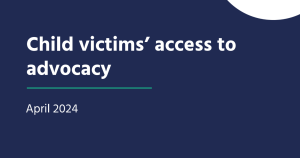It has been my long-held belief that if we get education right, regardless of where a child lives, where they are in the country or what their additional need, we can help every child achieve their ambitions.
In The Big Ask, children told me how much they loved school. In fact, school and education were the two most mentioned words by the 550,000 children who responded. They were ambitious for themselves, and they saw getting a good education as vital for their future happiness.
Vulnerable children, such as those with SEND or awarded pupil premium, were even more likely than their peers to say that education was important to their future. However, it’s vulnerable children are the least likely to be attending school regularly. For example, 34% of pupils receiving Free School Meals (FSM) were persistently absent in autumn 2021, compared to 20% of pupils not in receipt of FSM1. In my Attendance Audit, I found that the reasons for this persistent absence often come down to a lack of bespoke support that children and families are looking for.
We must do more to support our most vulnerable children to ensure that they feel confident to be in school every day, ready to learn.
A big part of being able to do this is being able to provide the right kind of educational provision. We need an educational system that is truly designed for and around the needs of all children. For some, this might take the form of alternative provision (AP).
So, when the Department for Education (DfE) launched their consultation on how unregistered AP is commissioned and delivered, I turned to the children who used these services to understand their experiences and what we could do better to support them.
I used conversations with nearly 100 children in different types of AP settings to get insight into the services they use and how these could be better integrated into the mainstream educational provision.
The overwhelming message from children was simple – they want a system that views AP holistically as part of the wider education sector, where provision is designed around the needs of children locally and integrated with both mainstream and special schools.
I used this message as the basis of my response to the DfE consultation, which I am publishing today. My recommendations provide solutions to some of the problems the children identified and beginning of a way forward for these children. These include giving local authorities a statutory duty to arrange AP for those young people with SEND aged between 16 and 18 to avoid a sudden end of support and building AP as part of a wider family of schools to facilitate a smooth transition back into mainstream schooling and better communication between settings.
Let’s work together, as educators, to make sure that we have a system that provides the right support for every single child to achieve their goals and ambitions.






